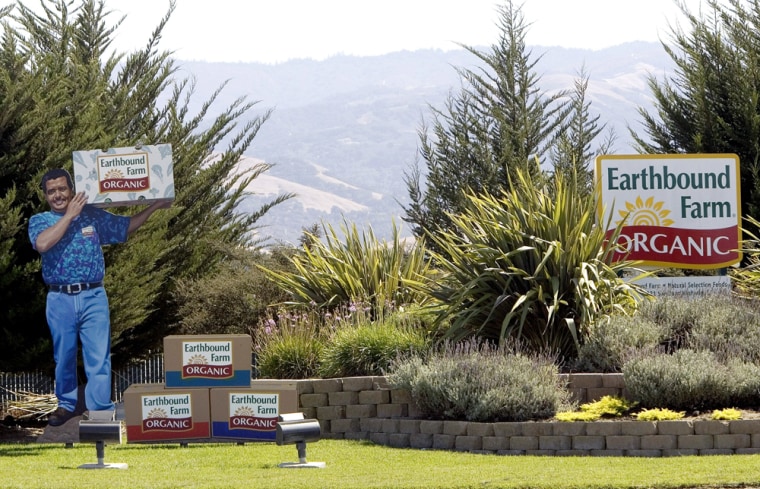Drew and Myra Goodman, the husband-and-wife produce team whose business is at the center of the E. coli spinach crisis in California's Salinas Valley, did not plan on becoming farmers.
They grew up in Manhattan. Drew's father was an art dealer. Myra's father was a jewelry manufacturer. They went to college in California — Drew in Santa Cruz, Myra in Berkeley — and stayed. The reason: a 2 1/2 -acre raspberry farm in the back of a Carmel Valley home, an investment property of Myra's family where the couple was living in a guesthouse.
To pass some time before graduate school, they opened a roadside farm stand. They grew raspberries, and baby greens, which they sold to a local chef. What they had left over, they packed in plastic bags to eat during the week. When the chef left town, they decided to sell the packaged greens to grocery stores on consignment. Those little plastic bags, coupled with the rise of busy consumers trying to eat more healthfully, led the Goodmans to a $360 million-a-year produce business.
"They started farming totally on a whim," said Samuel Fromartz, who detailed their story in his book "Organic, Inc." "They hit the right product at the right time, and the thing took off."
Their company, Natural Selection Foods LLC, is one of the largest fresh produce companies in the nation, and it elbowed into conventional greens after becoming popular for organic produce. Now Natural Selection is the focus of an investigation into E. coli contamination of fresh spinach that has shaken the state's $258 million-a-year industry and kept the popular vegetable off dinner tables across the country.
Michael Pollan, who wrote about the family in a recent book, "The Omnivore's Dilemma," said, "The real vulnerability in the business model is that when you highly centralize the food supply .... when there is a problem, the problem is going to get really big."
Natural Selection's plant compound in San Juan Bautista, Calif., sprawls across the equivalent of at least two city blocks, with beige and gray industrial buildings and warehouses two stories high, mobile office trailers and parking spaces behind high chicken-wire fencing. A row of sunflowers and a small grassy lawn are planted near the entrance, and low fields of leafy greens surround the plant on all sides. Long trucks rumble in and out. Workers wear hard hats or hairnets and heavy boots.
This week, television news vans equipped with satellite dishes have parked at the edge of a spinach field, just close enough to the plant to show the company's logo behind the reporters.
One recent afternoon, camera stands and light deflectors sprouted from the dirt where long rows of overripe spinach reached a road next to the plant for Natural Selection's leading brand, Earthbound Farm. Reporters in vans fixed their makeup and chatted on cellphones while they waited to stand in the field and give their reports.
The Goodmans have not commented on the outbreak. However, a company spokeswoman told the Associated Press: "We are very, very upset about this. What we do is produce food that we want to be healthy and safe for consumers, so this is a tragedy for us."
Natural Selection and Earthbound are noted both for their size and their contributions to research on organic farming, said Bob Scowcroft, executive director of the Organic Farming Research Foundation in Santa Cruz, which receives some financial support from Earthbound.
Of the more than 2,000 organic farms in California, most are small, sole-proprietor businesses, Scowcroft said. Earthbound Farm and another company, Grimmway Farms, are the only two that have turned organic farming into big business.
Earthbound Farm operates some of its own fields, and partners with processors, but for the most part, the company has grown by operating as an intermediary between individual farmers and supermarket chains, Scowcroft said.
"They have relationships with 170 other farms, some of them very large," he said. Those farms are all along the West Coast, with some in Mexico and Chile, so produce can be picked year-round. The company promises an array of produce in vast quantities to a big-box store or grocery chain, and then contracts out with small farmers to grow what it needs, when it needs it.
"The box stores and supermarket chains are sort of the tail wagging the dog here," Scowcroft said, adding that small farmers respect Earthbound Farm for helping them reach wider markets.
